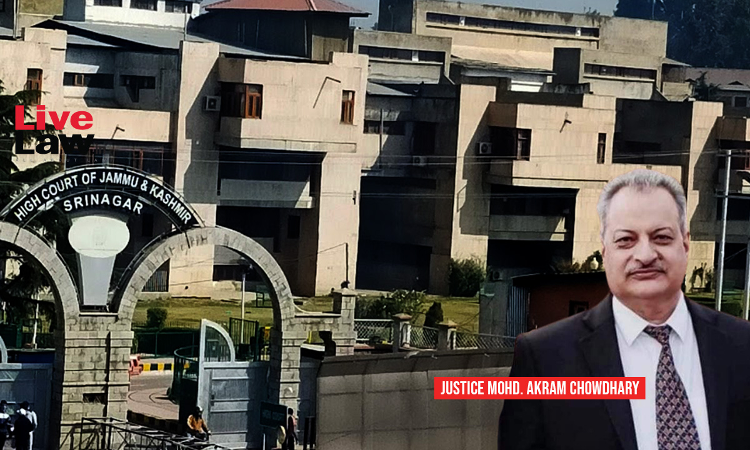- Home
- /
- High Courts
- /
- High Court of J & K and Ladakh
- /
- History Sheets Only To Be Opened If...
History Sheets Only To Be Opened If Authority Reasonably Convinced Of Habitual Offending: Jammu & Kashmir High Court
Basit Amin Makhdoomi
25 Sep 2023 10:30 AM GMT
The Jammu and Kashmir and Ladakh High Court recently ruled that law enforcement shall strictly adhere to established parameters in Police Rules while opening or retaining history sheets. It added that a history sheet can be opened only on the subjective satisfaction of the authority that the person is a habitual offender. Justice M A Chowdhary added that authorities must exercise this...
The Jammu and Kashmir and Ladakh High Court recently ruled that law enforcement shall strictly adhere to established parameters in Police Rules while opening or retaining history sheets. It added that a history sheet can be opened only on the subjective satisfaction of the authority that the person is a habitual offender.
Justice M A Chowdhary added that authorities must exercise this discretion based on reason and justice, not personal opinion or whims and their actions should adhere to the law and established procedures, avoiding arbitrary, vague, or fanciful decisions.
"The criteria for opening a history sheet is the subjective satisfaction of the authority and it has to be arrived at, on the reasonable belief or knowledge that the person, for whom the history is opened or retained is habitually addicted or aid or abet, the commission of crime, whether convicted or not etc...The discretion of the authorities has to be exercised, according to the rules of reason and justice and not according to private opinion, according to law and not humour. It is to be not arbitrarily vague, fanciful, but legal and regular and it must be exercised within the limit to which an honest man competent to discharge of his office or to confine himself."
The petitioner had moved the Court seeking to quash a 'Verification of Character and Antecedents Certificate' that described him as a history-sheeter and under surveillance as of November 19, 2022. The petitioner, a prominent politician who had contested State Legislative Assembly Elections in 2014, argued that this was unwarranted and detrimental to his reputation.
The petitioner alleged that various cases had been registered against him out of political vendetta, but most had ended in acquittals. The petitioner argued that the certificate branding him as a history-sheeter was thus unjust and must be quashed.
The petitioner added that branding a person as a history-sheeter has severe consequences, subjecting them to various restrictions and police surveillance, making them social outcasts. He asserted that such a decision should not be taken lightly and can only be justified with sufficient evidence.
However, the respondents argued that the petitioner had been involved in numerous criminal cases, including serious offences like theft and rape, making him a threat to public order. They contended that his history sheet had been opened to monitor his activities and prevent further criminal acts.
They added that whether a person is acquitted or convicted is immaterial when opening a history sheet, as it is about profiling a person's criminal track record. The respondents argued that the petitioner's involvement in numerous cases justifies opening a history sheet to control criminal activities in the area.
Justice Chowdhary noted that Rule 702 of the Police Rules, 1960, stipulates that opening a history sheet should be a careful and reasoned process, and the decision should be made by experienced officers.
Emphasising that the preparation of a history sheet should not be a mechanical exercise but a deliberate decision based on reasonable grounds, the bench remarked,
“The Police Rules also do not leave the matters at the sole discretion of any one police officer, as the same is required to be dealt with by the senior officers as well. All materials have to be considered and no relevant material should be excluded from consideration. There has to be a deliberated decision taken, giving reasons which should reflect application of mind to such materials, after all being leveled a history sheeter as grave and adverse consequence for a person and, therefore, such a power should be exercised with caution and responsibility”.
While noted that the branding of a person as a history-sheeter can have significant societal repercussions, affecting not only the individual but also their family members and associates, the Court stressed that law enforcement agencies must exercise this power with caution and responsibility, taking into account constitutional rights, particularly the right to privacy guaranteed under Article 21 of the Indian Constitution.
“Needless to say that every person wants to live with dignity and he/she cannot be condemned arbitrarily. It is also to be borne in mind that estrangement of the members of the history sheeted person in social gathering etc., is not uncommon in order in our society. Therefore, opening or retention of history sheets, which interferes with the right of privacy of a person, should be done strictly, adhering to parameters inbuilt in the police rules, keeping in mind the object sought to be achieved”, the bench maintained.
Considering that four out of five cases against the petitioner resulted in acquittals and one was not proved, the court concluded that the petitioner cannot be labelled as a habitual offender. It found that the opening of the history sheet did not follow proper procedures and violated the petitioner's fundamental rights under Article 21.
“It also appears that the history sheet of the petitioner has been opened not in accordance with the relevant police rules and the opening of the history sheet against the petitioner offends his fundamental right enshrined in Article 21 of the constitution of India”, the bench maintained.
Accordingly, the court allowed the petition and ordered the removal of the history sheet opened against him.
Case Title: Bashir-Ud-Din Vs UT Of J&K
Citation: 2023 LiveLaw (JKL) 252


